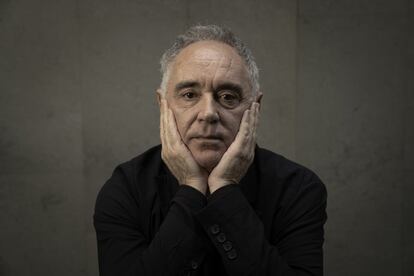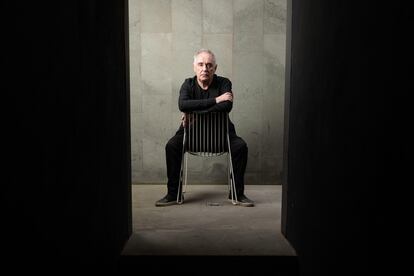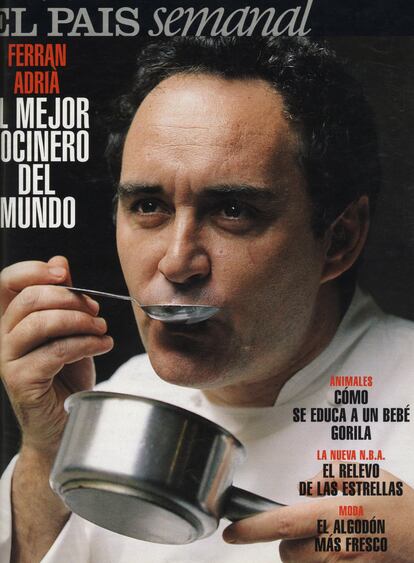Ferran Adrià: ‘If elBulli had stayed open, I could have hit rock bottom’
The renowned Spanish chef is in the spotlight once again, with the opening in June of elBulli 1846, an ‘exhibition lab’ to celebrate the culinary madness of the famous modernist restaurant on Spain’s Costa Brava, which closed in 2011

Ferran Adrià has a reputation for being punctual. He arrives by cab before our scheduled interview at the garden of the Alma Barcelona Hotel, a stone’s throw from Passeig de Gràcia, in Barcelona, Spain, his city of birth. The 60-year-old master chef is dressed in dark clothes, his usual uniform. He gets right to the point, but not before inquiring about the latest gastronomic gossip from Madrid, and asking for restaurant recommendations. He likes to eat, and he likes to keep up on the latest news. In a few months, Adrià will open his latest and most anticipated gastronomic project yet, on Cala Montjoi beach, on Spain’s Costa Brava. The opening has been delayed for eight years, due to problems with construction, environmental protests and the pandemic. But this June will mark the official opening of elBulli 1846, a gastronomic “museum” that aims to preserve and honor the memory of the original elBulli, which closed in 2011 and is still remembered as one of Spain’s greatest and most innovative culinary experiments.
Question. Can you explain what you’re trying to do with elBulli 1846?
Answer. It’s a museum where we explain what elBulli did, and honor the importance it had and still has. That restaurant marked a paradigm shift in Western gastronomy. We have everything: the space is nearly 3,000 square meters, and you will be able to see elBulli as it was. People who knew the restaurant will be thrilled. Nothing will be eaten. It’s important to keep the legacy of what happened alive. Today’s young chefs, chefs in their 30s, they didn’t live through the boom of Spanish culinary creativity. They think it’s always been the same, but in the early 90s, we weren’t part of the world’s gastronomic elite, not like now.
Q. Despite having retired from the kitchen, do you still consider yourself a global leader in culinary arts?
A. Yes, yes. You can see what Ferran Adrià and elBulli have contributed in the series elBulli, historia de un sueño [elBulli, the history of a dream, directed by filmmaker David Pujol]. There are 15 episodes, each 50 minutes long. It was incredible, what we did there. If I had to summarize it, it would be that we opened the creative door to other countries in the world. Before, it was unthinkable that Latin America, Sweden, Croatia or South Korea would be home to such creative chefs with such unique identities. That was the most important thing. We said: think first, then cook. Good creative cuisine happens when people discuss what they’re doing, and think hard about how to do it. And that’s true for gastronomy, Spanish products, quality tourism.
Q. Are you nostalgic for those years?
A. It’s not so much nostalgia, it’s the memory of what we did, and of the people who participated. Nearly 2,000 people worked there. Closing for six months of the year made that possible. Eighty percent of our team was always new. When I closed the restaurant, I did it with conscience. It was a very thought-out decision. The mission of elBulli was to push the limits of gastronomic experience. And this opened up paths that some people could follow and other couldn’t. We shared the space, and it was very important. In 2008, we could see that we’d reached our limit. We could progress a little bit every year, but after serving a menu with 44 different variations, as we did in the latter years, and seeing our own limits, on a physical, mental and spiritual level, we knew we couldn’t go much further. Developing techniques and recipes that could open new paths was no longer so easy. So we decided to move on. It was a good decision for elBulli.
Q. And was it a good decision for you?
A. Yes. I worked 16 hours a day, with all the pressures we put on ourselves. One of the successes of elBulli was that we were self-motivated, the pressure came from ourselves, nobody told us that we had to change the menu every year. Now, when you’re a creative chef at a prestigious restaurant, you’re asked to be more creative every year. That wasn’t the case before. With nouvelle cuisine, it’s always creative, but no one asked chefs to change their dishes every year.
Q. There’s a lot of talk now about how to manage pressure and stress in kitchens. Were you concerned about the importance of addressing mental health issues?
A. Those were different times. Now, young people starting out want to have a good quality of life, a good work-life balance, to work eight hours a day, which is normal in other professions. At that time, everything was about passion. At elBulli, staff had to be forbidden from coming to work early. People came to work there for six months, and wanted to make the most of it.
Q. You’ve been called a genius. How do you organize the ideas and projects you’re juggling around in your head?
A. In that respect we were always very scientific, we had a very orderly mental process, were always asking why we were doing certain things, always asking ourselves questions. And that’s how we did what we did. Without this organized mental process, it would have been impossible to make more than a hundred recipes a year, or to have a creative team. That concept did not exist.
Q. You always speak in the plural.
A. Without the team, none of what we did would have been possible. A restaurant is not just a kitchen. When we started holding meetings between the kitchen and the wait staff — something we learned from the United States — it came as a shock. In Spain, there were never any meetings or dialogue between the two sections. At elBulli, we had 40 cooks and 20 waiters. One day I took a serving tray, went to the dining room, and handed it to a waiter. That day, the relationship between the kitchen and the dining room changed. We were one, not two. We tackled the work together, and learned together. This had an influence on the younger staff, who are much more educated and mature now. The best workers today are better trained than the best ones from before.
Q. Has your career always been so successful? Have you ever hit rock bottom?
A. No, but if elBulli had stayed open, I could have hit rock bottom.... We had a mentality that, if we’d kept going at that level of creativity, we would have burned out and started making mistakes. Of course, I avoided that. I anticipated the failure and closed the restaurant, but I guess we can’t be sure about things that never happened, so who knows. It would have at least been a difficult moment for us, because we had a mission, and not achieving it would have been very frustrating for us.
Q. But you did anticipate it.
A. Yes, but on the other hand, we could have stayed open, because there are millions of people in the world who love gastronomy and hadn’t tried elBulli. These people wouldn’t have minded a menu from 2011 or 2010. There are dishes and recipes that have stood the test of time.
Q. You don’t miss anything from those years?
A. No, because it can’t be repeated. If I got an offer to start a restaurant with no limits, it wouldn’t be the same as elBulli, it’s not the same era. Today, social media and the internet are wonderful for some things, but they have their drawbacks; they show you everything you’re going to eat in restaurants beforehand, and it makes it lose its magic. There are no surprises anymore. People who came to elBulli didn’t know what they would find. It’s a problem for creative surprises, which are essential when you go to a restaurant like that. When I go to a very creative restaurant, I don’t look on social media to see what they’ve been offering.

Q. Do kitchens copy each other a lot?
A. Copy is a derogatory word. People struggle to be creative, and those who try to do something different should be rewarded. I took advantage of all my knowledge of nouvelle cuisine. If you look at elBulli’s menus, you’ll see that I took advantage of other chefs’ creativity. The point is to be honest, but you have to ask that of elite restaurants, you don’t have to ask it of your average restaurant. Today, we use all the recipes and concepts that have been developed over the last 60 years, plus what has been invented and improved on over the past 5,000 years. We didn’t invent olive oil, or flour, or thousands of recipes that we take advantage of today. Other than that, making a unique restaurant depends on the capacity of everyone involved.
Q. El Barri, the restaurant group in Barcelona managed by your brother, Albert Adrià, went bankrupt a couple of years ago. Have you offered him any advice?
A. We’ve talked, but he’s totally capable of figuring it out on his own. What happened was the result of bad luck and a series of different circumstances. Albert is focused on his new restaurant, Enigma. In business, in high-level catering, you have to adapt and adjust to changes. The issue of inflation, the scarcity of rare raw ingredients, and the issue of personnel are major problems, and you have to adjust prices and expenses. A high-level, high-priced restaurant is more difficult to run than a €40-restaurant. It’s a question of supply and demand.
Q. You mentioned staff shortages. People used to come from all over the world to intern at elBulli and work for free. All that’s changed now.
A. All the great restaurants of the world still use stages [internships]. Should they pay a little bit? That’s a debate we’ve been having for years. If it weren’t for the stages, chefs who wanted to make it to the very top wouldn’t have had the opportunity to train. This is how it was before, but now you pay everybody, and you add it to the customer’s bill. And if the market will bear it.... If you want to see what is going to happen in the future, you always have to look at France. When you go to Paris, you have €400 or €500 menus. I’m very much in favor of those in the profession having the schedules and salaries they deserve.
Q. The restaurant El Celler de Can Roca has its own psychologist, and the chef Dabiz Muñoz says he’s been much happier since seeing a psychologist. Have you ever needed therapy?
A. I’ve never seen a psychologist. In that era, we were all very naïve, we were building something. We weren’t aware of what we were doing. I knew what I wanted — a more tranquil life, to spend more time with my wife — and the creative pressures I put on myself were great.
Q. But too much pressure can make a person break.
A. That only happens to people who look to go beyond the limits. Most of the top restaurants are looking for friendly creativity, to have an economic reward for their efforts, and to make people who go to their restaurant happy. It’s not normal to have such intense pressures. I don’t miss it.
Q. Who will be your successor?
A. It’s not something you have go searching for. And I’m not talking about Ferran or elBulli — everyone has to find their own way. From there, it’s other people who put you in the place they decide to. Creative restaurants have become such a global phenomenon that it’s difficult for a restaurant as influential as elBulli to stand out. These are different times. Today’s chefs are better trained than we were, they are better professionals, but creativity at the highest level is another thing entirely. For that, you have to have tremendous talent.
Q. Are they less creative then?
A. No, no. At the highest level, they’re more creative than before. At the level of extraordinary creativity, it’s another thing. I’m sure we’ll see many new influences yet to come. We still tend to see China as very far removed, when it has the most complete and complex traditional cuisine there is. How to make the experience of going to a restaurant a groundbreaking one, that’s another question. I don’t know.
Q. Will China be the next culinary hotspot?
A. Without a doubt. It’s already happening. Covid stopped people from travelling, but what’s being done there is very interesting. Spain will continue to be up there too, because we changed the paradigm, but we’ll also see other countries start to reach that level. Spain competes with many countries, but we have a baseline know-how built on years of experience. Our generation — and here I include chefs, clients, journalists and restaurant professionals — have experienced things that will never be repeated. People who enter gastronomy today do not have that history. Only those of us who lived through that incredible era have it.

Q. What would have to happen for you to start cooking again?
A. I cook at home, making simple dishes. To think about creativity in the kitchen, I don’t know if I could again, after so many years. I’d have to prove myself. What I like to do is help young people who have a lot of talent, especially in terms of thinking, and that’s what we’ve done these past few years with Bullipedia. It took us six years to write the book, What is Cooking, and I think everyone who works in this profession should have a copy on their shelves.
Q. What if a group of investors came to you with a check in hand?
A. I’ve had offers to cook again, but I always say no. I’m frugal. I like to travel and eat well, but I don’t have any other expenses. There’s an image that restaurants make a lot of money. Some of them do, but those that bet on creativity don’t make a lot of money. Another thing is alternative businesses, which is what I did, setting up a business model in which the restaurant was not the main cash flow.
Q. Do you think you will ever write a memoir?
A. Of my real memories, I don’t know. If I were to explain everything I know... (laughing). I was in the eye of the hurricane and I knew all the hurricanes there were. I don’t know what I would contribute.
Q. Can you tell us a little more about yourself as a person?
A. My autobiography would be simple to write. I don’t feel like I’m a very unknown person, with the thousands of interviews I’ve done. Time makes me see things differently. I don’t remember everything that happened at elBulli. I knew at the end of the 1990s that we were doing something important, with the cover of EL PAÍS SEMANAL in 1999, which had a shocking title: “The best chef in the world.” I never thought of myself as superior. I could feel satisfied on a professional level, but on a personal level I was just another person. I have always separated my personal life from my professional life. Incredible things have happened to me. What we struggled to do was to break new ground, not to be the best restaurant in the world. We never celebrated any awards.
Sign up for our weekly newsletter to get more English-language news coverage from EL PAÍS USA Edition
Tu suscripción se está usando en otro dispositivo
¿Quieres añadir otro usuario a tu suscripción?
Si continúas leyendo en este dispositivo, no se podrá leer en el otro.
FlechaTu suscripción se está usando en otro dispositivo y solo puedes acceder a EL PAÍS desde un dispositivo a la vez.
Si quieres compartir tu cuenta, cambia tu suscripción a la modalidad Premium, así podrás añadir otro usuario. Cada uno accederá con su propia cuenta de email, lo que os permitirá personalizar vuestra experiencia en EL PAÍS.
¿Tienes una suscripción de empresa? Accede aquí para contratar más cuentas.
En el caso de no saber quién está usando tu cuenta, te recomendamos cambiar tu contraseña aquí.
Si decides continuar compartiendo tu cuenta, este mensaje se mostrará en tu dispositivo y en el de la otra persona que está usando tu cuenta de forma indefinida, afectando a tu experiencia de lectura. Puedes consultar aquí los términos y condiciones de la suscripción digital.









































